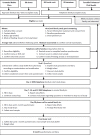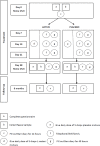Probiotics to improve outcomes of colic in the community: protocol for the Baby Biotics randomised controlled trial
- PMID: 22928654
- PMCID: PMC3508922
- DOI: 10.1186/1471-2431-12-135
Probiotics to improve outcomes of colic in the community: protocol for the Baby Biotics randomised controlled trial
Abstract
Background: Infant colic, characterised by excessive crying/fussing for no apparent cause, affects up to 20% of infants under three months of age and is a great burden to families, health professionals and the health system. One promising approach to improving its management is the use of oral probiotics. The Baby Biotics trial aims to determine whether the probiotic Lactobacillus reuteri DSM 17938 is effective in reducing crying in infants less than three months old (<13.0 weeks) with infant colic when compared to placebo.
Design: Double-blind, placebo-controlled randomised trial in Melbourne, Australia.
Participants: 160 breast and formula fed infants less than three months old who present either to clinical or community services and meet Wessel's criteria of crying and/or fussing.
Intervention: Oral once-daily Lactobacillus reuteri (1x108 cfu) versus placebo for one month.
Primary outcome: Infant crying/fussing time per 24 hours at one month.
Secondary outcomes: i) number of episodes of infant crying/fussing per 24 hours and ii) infant sleep duration per 24 hours (at 7, 14, 21, 28 days and 6 months); iii) maternal mental health scores, iv) family functioning scores, v) parent quality adjusted life years scores, and vi) intervention cost-effectiveness (at one and six months); and vii) infant faecal microbiota diversity, viii) infant faecal calprotectin levels and ix) Eschericia coli load (at one month only).
Analysis: Primary and secondary outcomes for the intervention versus control groups will be compared with t tests and non-parametric tests for continuous data and chi squared tests for dichotomous data. Regression models will be used to adjust for potential confounding factors. Intention-to-treat analysis will be applied.
Discussion: An effective, practical and acceptable intervention for infant colic would represent a major clinical advance. Because our trial includes breast and formula-fed babies, our results should generalise to most babies with colic. If cost-effective, the intervention's simplicity is such that it could be widely taken up as a new standard of care in the primary and secondary care sectors.
Trial registration: Current Controlled Trials ISRCTN95287767.
Figures
References
-
- Wessel MA, Cobb JC, Jackson EB, Harris GS, Detwiler AC. Paroxysmal fussing in infancy, sometimes called "colic". Pediatrics. 1954;14:421–434. - PubMed
Publication types
MeSH terms
LinkOut - more resources
Full Text Sources
Other Literature Sources



